|
|
|
Sort Order |
|
|
|
Items / Page
|
|
|
|
|
|
|
| Srl | Item |
| 1 |
ID:
140460
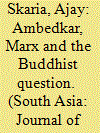

|
|
|
|
|
| Summary/Abstract |
This essay tries to frame one question, which at its most abbreviated can be posed thus: why does Ambedkar convert to Buddhism? Given Ambedkar's militant secularism, to ask this question is also to ask: what assumption of responsibility does that conversion enable which exceeds secular responsibility? This essay tracks how Ambedkar's religion questions both the liberal concept of minority, and the dissolution of the minor that is staged in Marx's critique simultaneously of religion and secularism. Buddhism becomes in the process a religion of the minor.
|
|
|
|
|
|
|
|
|
|
|
|
|
|
|
|
| 2 |
ID:
140459


|
|
|
|
|
| Summary/Abstract |
The story of print and religious publics in colonial India has largely been told as one of reformist groups and religious polemics. But this covers only a small part of the story of religious print, which extends well beyond reformist groups. This essay focuses on the most systematic and long-lived project of publishing sant orature (bani), the Santbānī Pustakmālā of the Belvedere Press, Allahabad. It examines its scope, aims and methods as well as its religious orientation and conceptualisation of a religious-devotional public in early-twentieth-century North India. Halfway between oral bhajan groups and the scholarly publications of the collected works (granthavali) of sant poets, throughout the twentieth century the Belvedere Press booklets have commanded tremendous currency as religious print-objects in the Hindi devotional public sphere. The results of one publisher's effort and investment, and of significant reorganisation of material from manuscript sources, these booklets have been extremely popular and lasting products in the extensive market for religious material, clearly a crucial technology for individual and group religious practice (bhajan), before which the lineages' own publishing efforts pale into quasi-insignificance.
|
|
|
|
|
|
|
|
|
|
|
|
|
|
|
|
| 3 |
ID:
140463
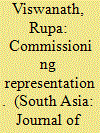

|
|
|
|
|
| Summary/Abstract |
Commissions of inquiry are unique tools of modern governance that represent ‘the people’, but in a manner quite unlike parliaments and other forms of elected political representation. Using as its example the 2007 Misra Report, this paper reveals how, in the production of a commission report, scores of non-state actors—‘stakeholders’ from a wide range of social strata—are enlisted to produce the policies that will then redound upon those very stakeholders. In thus consulting the people and eliciting their speech, commissions serve to publicly enact, in a controlled setting, the deliberative ideal of democracy that is otherwise absent in India. In this particular instance, the problematic status of Dalits is subsumed under the normative religious identity of the post-colonial Indian nation, a conclusion whose emergence through reasoned debate is publicly enacted in the form of the commission.
|
|
|
|
|
|
|
|
|
|
|
|
|
|
|
|
| 4 |
ID:
140458
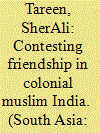

|
|
|
|
|
| Summary/Abstract |
This essay examines competing understandings of ideal publics in modern South Asian Islam by analysing a polemical debate among Muslim scholars about the boundaries of friendship between Muslims and non-Muslims. The specific context of this polemic was the pan-Islamic Khilafat movement and concomitant debates on the limits of friendship between Muslims, the British and Hindus. Through a close reading of this polemic, I show ways in which Muslim normative sources are mobilised and interpreted for radically contrasting ideological and political projects. The specific focus of this essay is on intra-Muslim contestations surrounding the category of muwalat (friendship or clientage), and it shows the opposing ways in which this category was approached by Indian Muslim scholars as either friendship between different religious communities or in terms of a citizen's relationship to a modern state. These varied understandings of muwalat, I argue, corresponded to diverging imaginaries of a moral public. This essay particularly focuses on the thoughts of the towering Indian Muslim scholars, Ahmad Raza Khan (d. 1921) and Abul Kalam Azad (d. 1958).
|
|
|
|
|
|
|
|
|
|
|
|
|
|
|
|
| 5 |
ID:
140457
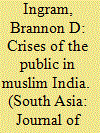

|
|
|
|
|
| Summary/Abstract |
This article argues that Sayyid Ahmad Khan (1817–98) and Ashraf ‘Ali Thanvi (1863–1943) were, respectively, exemplars of what I will call the liberal critique of custom on the one hand, and the Islamic legal critique of custom on the other. I argue that a range of overlapping semantic fields in their Urdu works—‘custom’ (rasm), ‘reform’ (islah), ‘decline’ (zawal, tanazzul) and ‘nation’ or ‘moral community’ (qawm), among others—opens up new lines of inquiry in comparing Aligarh and Deoband, typically treated as incommensurable in their views, as institutions and movements. I suggest, additionally, that ‘the public’ (‘amm) was a shared frame through which they envisioned implementing their respective projects. At the imagined centre of these publics, they located a new sort of Muslim: literate, self-regulating, self-fashioning, guided by rationality (‘aql) and free, above all, of the moral and social entanglements of ‘custom’.
|
|
|
|
|
|
|
|
|
|
|
|
|
|
|
|
| 6 |
ID:
140462


|
|
|
|
|
| Summary/Abstract |
Why did Mumbai's famous dance bars have to close in 2005? This paper analyses the ban and its aftermath in terms of (1) a colonial and post-colonial genealogy of the regulation of allegedly obscene public performances in India and (2) the provocative location of the dance bars vis-à-vis the cultural politics of consumerist globalisation. Combining a reading of arguments around the ban with first-hand ethnographic vignettes, the paper is a contribution to a critical analysis of the politics of publicity in India.
|
|
|
|
|
|
|
|
|
|
|
|
|
|
|
|
| 7 |
ID:
140456
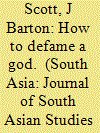

|
|
|
|
|
| Summary/Abstract |
This article argues that competing ideas about the nature of public selfhood structured the Maharaj Libel Case, as well as colonial publics more broadly. Jadunathji Maharaj had, in effect, lost his libel suit even before it went to court. For libel law, the essence of the human person is a private self that owns various forms of property, including the public persona known as ‘reputation’. For the Hindu Pushtimarg, meanwhile, the Maharaj was considered an incarnation of Krishna; his religious or public self preceded and was the ontological ground for his merely personal being. To compare these two conceptualisations of the self is to see how selfhood became an important site for the articulation of the public in colonial India.
|
|
|
|
|
|
|
|
|
|
|
|
|
|
|
|
| 8 |
ID:
140461


|
|
|
|
|
| Summary/Abstract |
Highlighting legal–governmental techniques by which the public is conceptualised as the market and market activity as public agency, this article poses India as a key site for a globalised analysis of neo-liberal governance. It opens a genealogy for India's ‘emerging market’ governance that extends back to colonial modernisation, highlighting ties between a coercive state, its benevolent performance and the making of a market society. Such a long view challenges the free market vs. strong state opposition so central to contemporary neo-liberal thought. It also calls attention to the nexus between powers of emergency and emerging markets. Elaborating, the essay engages Foucault's analysis of neo-liberal political economy to read recent Indian jurisprudence on financial markets, the rule of law, and public interest.
|
|
|
|
|
|
|
|
|
|
|
|
|
|
|
|
| 9 |
ID:
140464
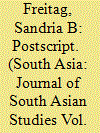

|
|
|
|
|
| Summary/Abstract |
This essay suggests the expanded scholarly terrain created to analyse ‘the public’ that has been mapped between an initial special issue of the journal South Asia: Journal of South Asian Studies (published in 1991) and this current essay collection (of 2015). In the process, it suggests not only what new scholarly interests and skills, as well as new sites for analysis, have opened up, but also points to issues yet unaddressed, along with elements of visual culture that scholars interested in ‘the public’ could consider. For the realm of the visual remains, even after 25 years, largely unconnected to analyses of ‘the public’, despite its centrality to the ways in which public issues, enactments and interests are expressed and debated. To provide overarching ways to think about how the essays presented here treat ‘the public’, as well as to draw attention to issues still not addressed that offer future challenges, this essay suggests conceptualising the subject around four aspects that emerged when the authors met together: the public as enacted; the public as envisioned; public space, both rhetorical and actual; and concepts of the public expressed as belief, interpretation, understandings, values and ‘public opinion’—that is, as concepts understood to motivate and influence their audiences.
|
|
|
|
|
|
|
|
|
|
|
|
|
|
|
|
| 10 |
ID:
140455
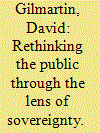

|
|
|
|
|
| Summary/Abstract |
The interrelationships of the various, seemingly contradictory, uses of the public as a concept are best understood by relating the concept to sovereignty. The concept of the public thus gained particular structural meaning in colonial India through the state's efforts to legitimise its authority as the embodiment of a discourse of reason in the nineteenth century, with the courts serving as a critical model for the public. With the emergence of the concept of the sovereignty of the people in the twentieth century, the nature of the public was significantly transformed, and gained increasing significance as an arena for the open performance of the autonomous self.
|
|
|
|
|
|
|
|
|
|
|
|
|
|
|
|
| 11 |
ID:
140454
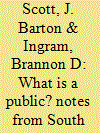

|
|
|
|
|
| Summary/Abstract |
In South Asia, as elsewhere, the category of ‘the public’ has come under increased scholarly and popular scrutiny in recent years. To better understand this current conjuncture, we need a fuller understanding of the specifically South Asian history of the term. Toward this end, our discussion begins by considering more than two decades of scholarship that have worked to excavate this history. We propose that two principal methods or approaches—the genealogical and the typological—have characterised this scholarship. We then suggest, more in the mode of genealogy, that the category of the public has been closely linked to the subcontinental history of political liberalism. Finally, we discuss how the essays collected in this special issue challenge some of liberalism's key presuppositions about the public and its relationship to law and religion.
|
|
|
|
|
|
|
|
|
|
|
|
|
|
|
|
|
|
|
|
|